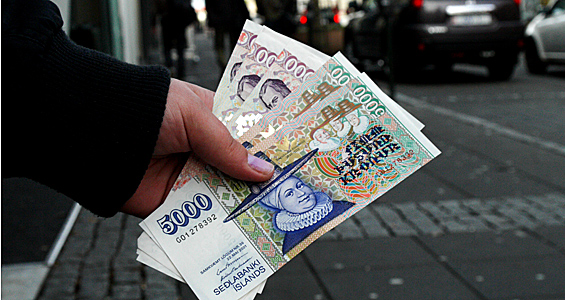Placing the blame in Iceland
Allegations of collusion and corruption emerge in the bankrupt state as poll nears.

 |
|
Iceland’s currency plummeted after the nation’s banking system collapsed [Gallo/Getty] |
Iceland is close to electing a new government, after the last regime was brought down following the country’s economic collapse.
Along with the promise of new leadership is the hope that those responsible for the country’s financial crisis will be brought to justice.
Iceland’s banking collapse last October was so sudden, so total, that it has taken a while for reality to sink in and the finger of blame to be cast.
The priority was counting personal losses: jobs, pensions, savings and homes.
| In video |
|
|
Then, in January, public anger turned on the government. The so-called “pot and pan revolution” saw protests outside the country’s diminutive parliament building and the prime minister pelted with bread and eggs.
In Iceland, this was violence on a grand scale. The nation had grown angry.
Since then the interim government that took over has achieved little in putting things right.
Collusion and corruption
The krona, Iceland’s currency, continues to plunge, unemployment is nudging 10 per cent and stories are emerging of vast sums secreted away by unscrupulous bankers in offshore tax havens. Anger is turning on them.
 |
| Banks borrowed cheap money and bought bad assets, leading to the system’s collapse [AFP] |
And allegations are coming to light of collusion and corruption: strange loans made by the banks to government ministers; best friends on banking boards and regulatory committees, dubious sales of assets among the banks aimed at inflating their real value.
In the end, Iceland’s enormous wealth was all an illusion.
The banks had borrowed cheap money from abroad and gone on lavish international shopping sprees.
Without much experience in either banking or buying, the young bankers had bought bad assets, worth little compared to accumulated debt many times the country’s GDP.
Johan Ausgrimsson, a banking insider now unemployed, says he knew the system was rotten, but powerful interests meant no one did anything about it.
“Very many wanted to get a piece of the cake. The politicians were really playing the game as well,” he said.
“So, there were too many people involved both in the parliament, in government, buddies within the regulatory environment. Nobody wanted shake the boat because everyone was somehow connected to it.”
‘Greed and self-delusion’
For its part, the current interim government, likely to remain in place after Saturday’s election, claims it is ready to get to the bottom of whatever wrongdoings went on.
Gylfi Magnusson, Iceland’s minister of business and banking, told Al Jazeera investigators would also examine claims of corruption involving the previous government.
“Obviously greed and maybe self-delusion were a big part of the problem. But that’s not illegal,” he said.
“Maybe it should be illegal, but it isn’t. Now to break the law you have to go further than that. So we’ll simply have to see whether the investigation brings that to light.”
With growing calls for accountability, the public prosecutor has leapt into action, hiring a big gun in the world of financial scandal investigations to head up its inquiry into Iceland’s banking collapse.
‘Suspicion of wrongdoing’
Eva Joly doesn’t look like a person to fear. But if you’re hiding financial crimes, you wouldn’t want her on your tail.
A French-Norwegian prosecutor and judge, Joly secured convictions in the infamous Elf Aquitaine corruption inquiry.
She won’t talk about the details of the investigation, but does she believe there is prima facie evidence of wrongdoing?
“If you came to Rwanda in ’94, I think you could say that there had been a genocide here, because you see that there are cadavers, you see the dead people all over.
“And in the same way I think we can say here in Iceland that there has been wrongdoing. This is a suspicion of wrongdoing, and this has to be investigated,” she said.
Joly insists she will cast her net wide. Economic crime, she says, is seldom committed solely within a country’s borders. She’s sure her fellow prosecutors abroad will be quick to offer help as the investigation looks into the extensive affairs of Iceland’s banks in foreign markets.
Investigating Iceland’s banking collapse could take years. But this tiny island is setting an example that others may follow. Dodgy bankers in London, New York and elsewhere will be watching with concern.
